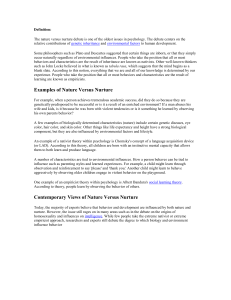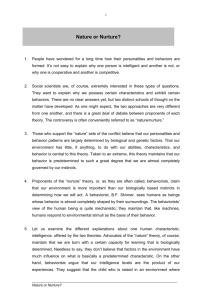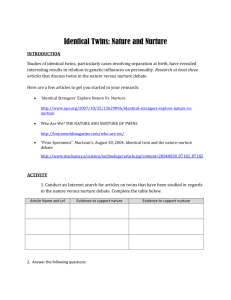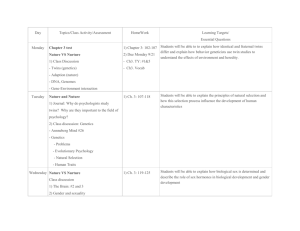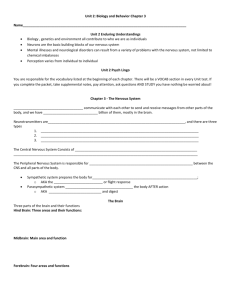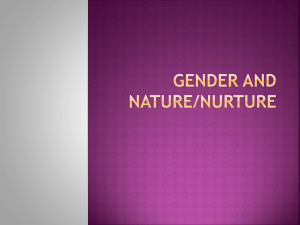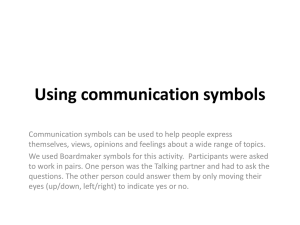Nature vs - WordPress.com
advertisement
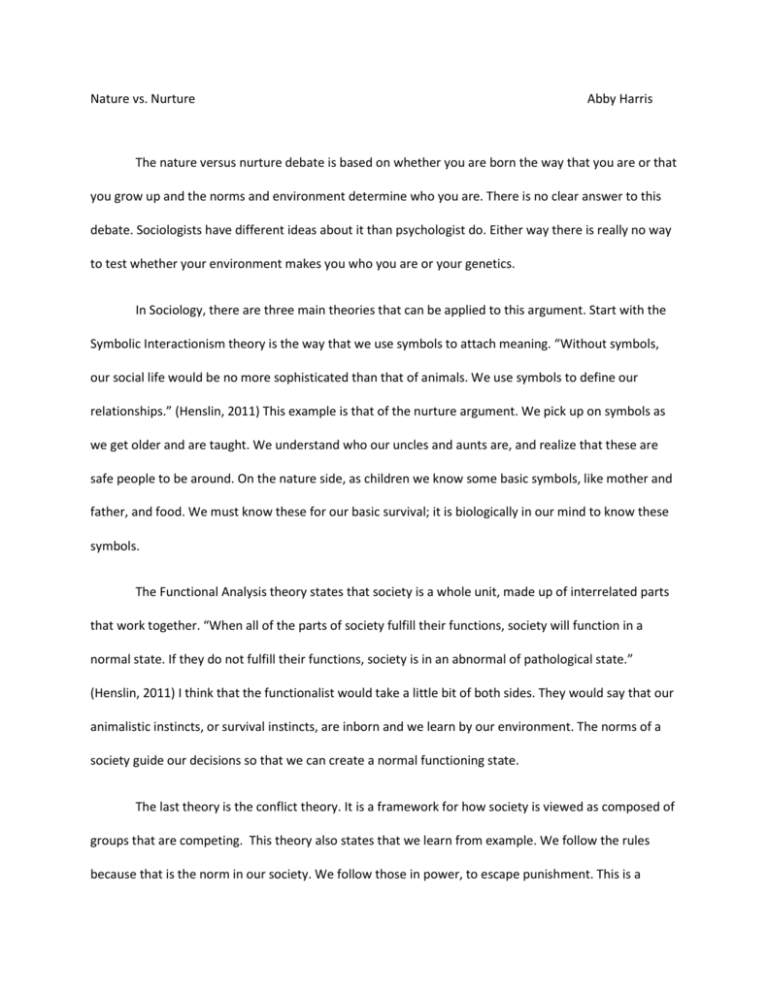
Nature vs. Nurture Abby Harris The nature versus nurture debate is based on whether you are born the way that you are or that you grow up and the norms and environment determine who you are. There is no clear answer to this debate. Sociologists have different ideas about it than psychologist do. Either way there is really no way to test whether your environment makes you who you are or your genetics. In Sociology, there are three main theories that can be applied to this argument. Start with the Symbolic Interactionism theory is the way that we use symbols to attach meaning. “Without symbols, our social life would be no more sophisticated than that of animals. We use symbols to define our relationships.” (Henslin, 2011) This example is that of the nurture argument. We pick up on symbols as we get older and are taught. We understand who our uncles and aunts are, and realize that these are safe people to be around. On the nature side, as children we know some basic symbols, like mother and father, and food. We must know these for our basic survival; it is biologically in our mind to know these symbols. The Functional Analysis theory states that society is a whole unit, made up of interrelated parts that work together. “When all of the parts of society fulfill their functions, society will function in a normal state. If they do not fulfill their functions, society is in an abnormal of pathological state.” (Henslin, 2011) I think that the functionalist would take a little bit of both sides. They would say that our animalistic instincts, or survival instincts, are inborn and we learn by our environment. The norms of a society guide our decisions so that we can create a normal functioning state. The last theory is the conflict theory. It is a framework for how society is viewed as composed of groups that are competing. This theory also states that we learn from example. We follow the rules because that is the norm in our society. We follow those in power, to escape punishment. This is a nurture theory. We don’t focus at all in the nature theory at all. The conflict theory, like the functionalism theory are macro sociological meaning they examine the patterns of society on a larger scale. This makes it harder to pinpoint whether this theory could even take a side on nature and nurture, but from what I see it looks like it focuses on learned behavior, making it nurture. Now that we have looked at the main theories in sociology, I want to look at Psychology to get a different perspective on this debate. It started as a philosophical issue, is our makeup innate or environmentally created? According to John Locke, our mind is a blank slate when we are born and must learn everything, on the contrary Rene’ Descartes says that our personalities are inborn. Many other Psychologists have studied both sides of the nature, nurture debate and no clear answer has been found. Some think that without a little bit of both no human can survive in a civilized society, which may be true. We cannot just use our basic inborn instincts; if we did they would call us deviants in society. Two perspectives that can be applied to this debate are the Behavioral perspective and the Evolutionary Perspective. Behaviorists think that we are conditioned to act and behave a certain way. We learn everything due to environmental conditions and base our actions on the thought of reward and punishment. Behaviorists believe that we are taught everything. That is how we learn to follow norms and customs in a society; this is how we become helpful members of a community, by the environmental factors that socialize us. The evolutionary perspective is that we have psychological traits that are set for survival. If this is true than us as humans are wired at birth to know how to survive, and do not learn this from our environment. This is also defined as natural selection. Although there is a different side to this debate, studies show that twins separated at birth and are raised in different environment, will most likely follow the norms of their environment, and leave their similar nature behind. Another extreme example is feral and isolated children. If a child is isolated, will he or she have the basic human functions that we all have because of their inborn nature? This is unsure, feral or wild children and animalistic, using their basic survival instincts to survive. Most of these children lack language and some cannot even walk like a normal person would. “Language is the key to human development. Without language, people have no mechanism for developing though and communicating their experiences.” (Henslin, 2011) Children will not learn or develop at a normal rate; children found in isolated positions usually have the intelligence of an infant. So is their nurture to blame? What have these isolated children learned from their environment? Nothing, these poor children rely on their basic human nature to survive. These children when found are not socialized at all. They are wild, and have no understanding of what is going on. “Society makes us human.” (Henslin, 2011) I find this very true. If not for the nurturing from family and environment, we would all be animalistic. Our genetics do play a role, like our observation of symbols in society, things that we latch onto because we have the knowledge that they are good. So out of all the sociological and psychological theories, I think that the symbolic interactions have it somewhat right. Even at a young age we recognize the basics and are taught to associate this with that. We are learning using symbols and this effects our socialization. Although I do like this theory, I’m still on the fence with the whole debate, I think that you must be taught, but without our basic instincts we couldn’t survive. You need both to be a civilized, helpful person in this society.
